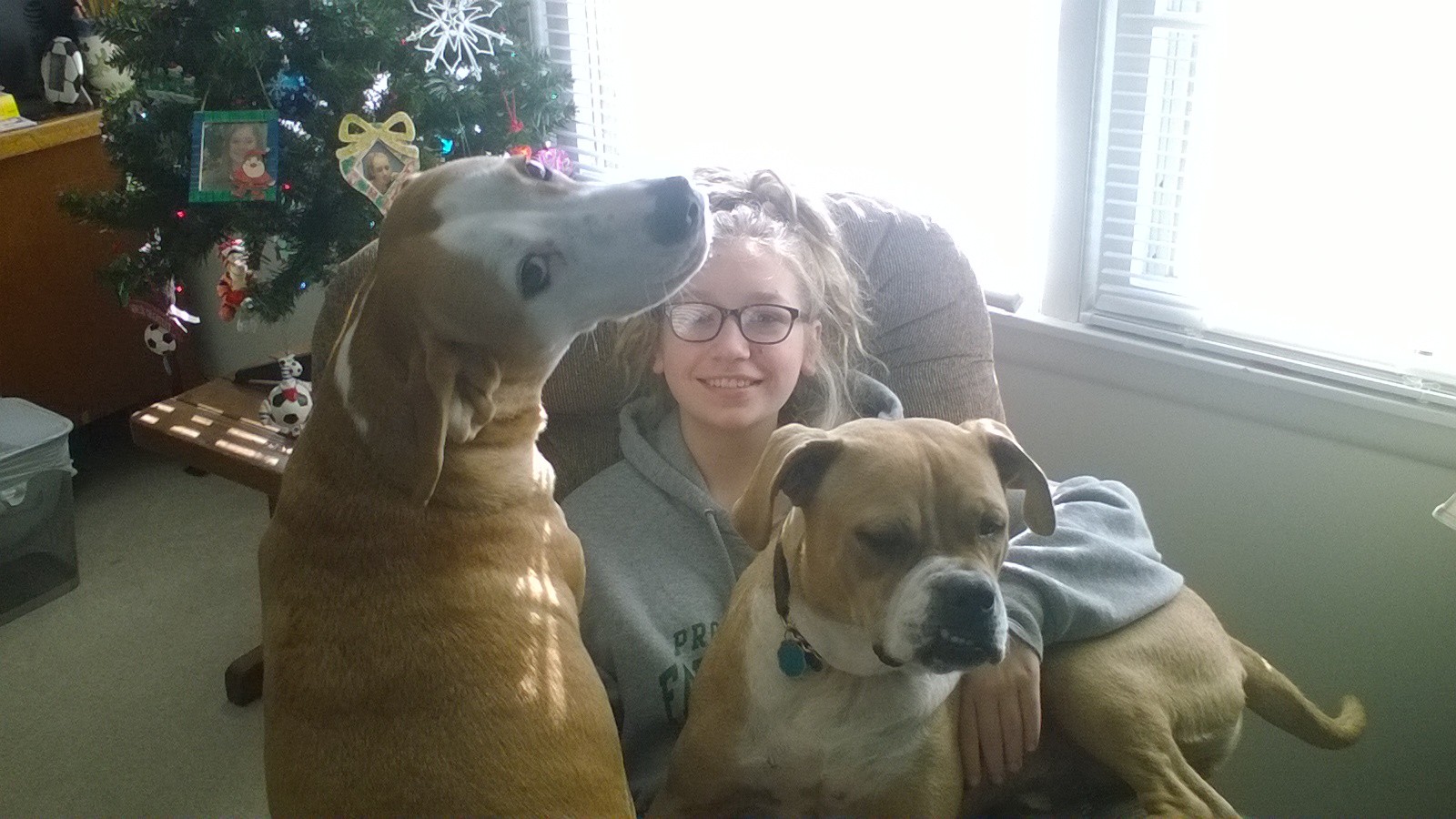'Pups Under the Bed: Consistency Is Key'
Last night, we had a pretty giant rainstorm. The noise of the rain woke both my wife and me in the dark hours of the early morning. The other noise that woke us, though, was of one of our dogs whining outside our bedroom door. This is not entirely unusual, because our newer dog (Bruiser) has a habit of waking us in the night to let him outside to go to the bathroom. However, when we heard the noise of the rain, we realized that 'outside' is the very last place this dog wanted to go right now. He wanted in our bedroom, where we were, because he was afraid of the storm.
The pups love getting to be on the couch at their grandparents' house!
Our other dog, Butterscotch, is also very afraid of storms: the noise, the lightning, all of it causes her to shudder and whine and find a place where she can bunker down until the weather improves. We don't know if our dogs are afraid of storms just as a part of their natural make-up--I know lots of pet owners have dogs with similar feelings about bad weather--or if it is more due to their background. What we do know is this: when there is bad weather, the dogs absolutely want to be wherever we are.
So when Bruiser woke us in the middle of the night, my wife got up and let Bruiser into our bedroom. Most nights he sleeps in my recliner in the den, in part because he likes it and in part because Bruiser is a bit of a loud sleeper most of the time: he's part bulldog and thus makes that snuffly-snoring noise a lot. But last night, after being allowed to come into our room, he was as quiet as a mouse. When I woke up this morning, both dogs came crawling out from under our bed (that's Butterscotch's usual sleep spot at night), ready to begin the day.
In that moment, I was struck by the dogs and how they operate like clockwork: when there is bad weather, they find us. They need to know that they are going to be protected and safe and dry. They need consistency, and they need to be reassured about it on a regular basis. And I find this is true in our positions of leadership as well. We need to provide models of consistency and stability for our audiences: our children, our employees, our players, whatever it may be.
They also love getting into the recliner whenever anyone sits down!
This principle is true throughout life: we may not always like or agree with whatever the rules are, but as long as they are being enforced consistently we can live with them. On the other side of the coin, when there is a situation that needs to be reconciled, we appreciate knowing that whoever is in charge will take care of it, and that provides us with stability and confidence in our leaders. This is the type of leadership we should strive to exercise: consistent and stable.
When we are inconsistent with our leadership, when we only enforce the rules occasionally, there will almost always be problems. This is true in a home when a child never really knows the boundaries because the parents are permissive one day and ultra-strict the next (for more on this, read any of the amazing books by Dr. Kevin Leman). This is true in a town when the laws are applied unfairly, even seemingly small things such as who gets pulled over in a speed trap. This is true in a company when certain employees are allowed to get away with shirking their duties while others have to pick up the slack. Inconsistency always leads to confusion, and this almost inevitably turns into frustration and anger.
Remember how frustrating it was as a child when your sibling got away with something that you got in trouble for? Or as a student when some classmates got away with the same behavior that got you reprimanded? Or even as an adult when we see injustice in the news or in our own towns? These issues are all due to inconsistency in leadership, and it is up to us, the leaders, to provide the consistency and stability that can solve these problems.
So today, let's commit to being consistent leaders, leaders who can be depended upon for stability in our organizations. Let us provide our audiences with confidence, because they know that whatever happens, we will be there to help sort it out. This will require wisdom, and it will require humility, so also be sure to ask a few trusted advisers to point out to you any areas of inconsistency that they see, in order that you can improve in these areas.
Action Step: Look for areas of inconsistency in your life and leadership, and decide on one way in which you can address the issue and provide more consistency for those in your charge.


